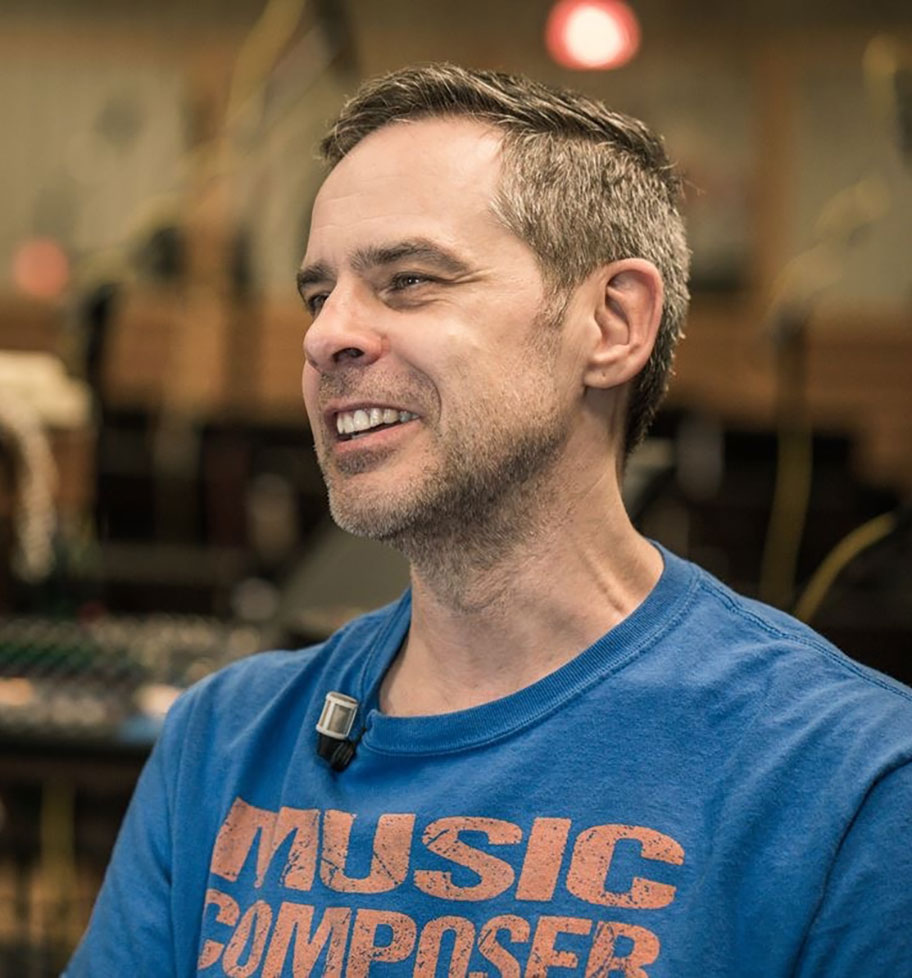RNCM Alumni: Composer Grant Kirkhope
Grant Kirkhope is a leading video game composer known for his work on titles such as Banjo-Kazooie, Donkey Kong 64, GoldenEye 007 and Perfect Dark, among many others. We chatted to him about his career and trajectory since graduating from the RNCM in 1984.
Did you always want to be a composer?

Banjo & Kazooie
I actually never wanted to be a composer, it never entered my head ever. Before the RNCM I played in quite a few metal bands on guitar as well as doing classical trumpet. And then after the RNCM I went back to playing in bands. Some did well, some did terribly. I ended up playing trumpet for a successful band called Little Angels – we did big tours supporting Bon Jovi and Van Halen and Bryan Adams! I also played in normal pub rock bands as well. That went on and off for 11 years until I was 33. That’s what I thought I would keep on doing for the rest of my life. But I had a friend called Robin Beanland who was also one of the guys who played in local bands in North Yorkshire, where I lived. One day he announced he’d got a job at a company called Rare Limited in the Midlands, writing music for video games. And I thought ‘Wow, that’s incredible.’ And so off he went, a year and a half went by and he suggested I also try writing music for video games… I was playing a lot of games at the time, so I thought why not? Robin recommended some equipment for me to buy and I set about writing music. And so I spent that whole of 1994 sat in my bedroom writing music. I sent in five cassette tapes to Rare Limited over the course of a year and never got a reply. But then out of the blue I got a letter saying please come and interview and I got a job – I couldn’t believe it! … It’s bizarre, because I was terrible at harmony at College. I don’t know what the RNCM is like now but when I was there you had to pass the harmony exam at some point in the four years. I failed it three years out of four, and I only just scraped by the last year by the skin of my teeth. So yeah, composing was the last thing on my mind. I wrote songs for the metal bands that I played for, but I never thought about being a composer, it was an absolute fluke. If Robin hadn’t encouraged me I never would’ve done it!
What are your career highlights?
I guess I’m very well known for a game called Banjo-Kazooie. That’s been a big one. I also got a BAFTA nomination for the score to Viva Piñata, in 2007 which was amazing. I worked on Mario + Rabbids Kingdom Battle – I was the first western composer to ever work on a Mario game; it was always done by in-house Nintendo composers. And a few years later I got to write a tune for Super Smash Bros. Ultimate. Again, I was the first western composer they’d ever used. I also worked on GoldenEye 007; that was a gigantic hit. I’ve been very lucky, a lot of the games I’ve worked on have been big successes. More recently I wrote a concert piece, KirkFeld, for Ian Bousfield. He’s been principal trombone for the Hallé, the LSO and the Vienna Phil.
What do you like about composing for video games?
I just like writing music, that’s what I like to do. It’s my one and only talent; I can’t do anything else. I’ve also written some stuff for movies now. When I started I was writing music for the original Game Boy, with three channels and a noise channel. Now I’m writing for live orchestra, which is fantastic… In terms of the composition process, for example I might be told, ‘There’s a level in the game that’s like a frozen ice castle.’ So straight away my mind’s thinking glockenspiel, celeste, pizzicato strings – things that are spiky, icy, in my head that’s how I see it. Or if I think of a warm forest somewhere I’d be thinking about bassoons and warms strings and stuff like that. I guess your mind instantly jumps to the thing you think it should sound like before you touch the keyboard. And the developers can send you all sorts: they might send you the design document or a little video clip, it depends what they have, or it might just be a chat on the phone. Or they might not have a very musical language to talk to you about, so I always say, ‘Find a clip that you think is in the right direction’ so I’ll have an idea of what they’re after. It is handy to have some kind of reference… My composing process is the same whatever media it is, from mobile phones to movies, it doesn’t make a difference to me. I’m not a particularly intellectual composer, I just mess around until it sounds good. I compose on keyboard; when you’re doing it on a computer you can record it bit by bit. And I am writing orchestral stuff these days so I use instrumental libraries.
What are your memories from the RNCM?
I was there from 1980 to 1984. It was nice being surrounded by musicians. My biggest take away was the orchestra rehearsing in the main concert hall every Tuesday and Thursday. I don’t think I ever missed that in the four years I was there. I really feel like I got to hear so much great stuff and see it broken down. I really enjoyed it. To be exposed to pieces I’d never heard before, it opened my ears to new stuff. Now composing for live orchestra I think the experience was pretty invaluable as well for understanding how an orchestra works.
Any advice for graduates interested in media composition?
I think that if you’re a great composer and you stick your own music on your website or on YouTube, you’re probably not going to get anywhere. There are a billion people doing that. You need to get yourself into the circle where the people are doing what you want to do. Especially in LA where I live now, having the talent is only 50 per cent of the battle. The other half of it is undoubtedly your networking. Sometimes people are lucky, but it’s one in a million. Also being amicable is important. I say to people: ‘Don’t argue with the creative director, it’s a stupid idea.’ Because there’s a person stood right behind you prepared to co-operate. You’ve got to be prepared to make changes and be willing to compromise. Whatever people ask you for, just say yes. Even if you don’t have a clue, go home and google it. As a media composer you have to be ready to do anything – you never know what each opportunity might lead to next.
What are your plans for the future?
I have a few things in the works that I’m not legally allowed to talk about! I wrote a trombone piece called KirkVern for Charlie Vernon, the bass trombonist for the Chicago Symphony. He hasn’t premiered that yet, he was going to do as coronavirus popped up – so that’s still on the cards. I have just done another indie movie called Shadows, that’ll be out later this year. And at some point I want to eventually write a symphony – I think I should leave one behind. That’s my plan.
To find out more about Grant and his music click here.
26 August 2020


